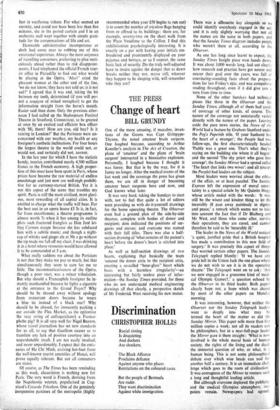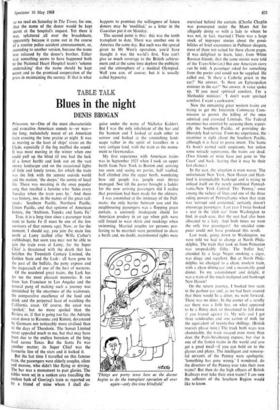Change of heart,
THE PRESS BILL GRUNDY
One of the more amusing, if macabre, inven- tions of the Goons was Capt Grittpype- Thynne, the noted amateur brain surgeon. One laughed because, according to Arthur Koestler's analysis in The Act of Creation, the plane of 'amateur' and the plane of 'brain surgeon' intersected in a bisociative explosion. Personally, I laughed because I thought it was funny. But that is by the way, for it is funny no longer. After the medical events of the last week and the coverage the press has given them, we are all in danger of becoming amateur heart surgeons here and now, and God knows what later.
It was very hard, taking the Sundays to start with, not to feel that quite a lot of editors were providing us with do-it-yourself drawings for the home operating theatre. The Observer even had a ground plan of the side-by-side theatres, complete with bodies of donor and recipient; dots indicated the positions of sur- geons and nurses; and everyone was named with their full titles. There was also a half- section drawing of 'what remains of the patient's heart before the donor's heart is stitched into place.'
As well as half-section drawings of two hearts, explaining that basically the team 'sutured the donor atria to the recipient atria, creating a so-called "hour-glass" heart which beats with a harmless irregularity'—an interesting but fairly useless piece of infor- mation—the Sunday Times provided, for those who do not understand medical engineering drawings all that clearly, a perspective sketch of Mr Frederick West receiving his new motor. There was a silhouette key alongside so we could identify everybody engaged in the act, and it is only slightly worrying that not all the names are the same in both papers, and that the Sunday Times diagram includes people who weren't there at all, according to the Observer.
As one has long since learnt to expect, the Sunday Times Insight piece won hands down It was about 3,000 words long, laid out clearly how research and practice have gat nearer and nearer their goal over the years, was full of convincing-sounding facts about the prepara- tions for last Friday's epic, and was compulsive reading throughout, even if it did give you a turn from time to time.
None of the other Sundays had technical pieces like those in the Observer and the Sunday Times, although all of them had yards of coverage of other kinds, of course. The nature of the coverage not Unnaturally varied directly with the nature of the paper. Leaving aside the pure news stories, the News of the World had a feature by Graham Stanford under the Peg's Paperish title, 'If your husband has the heart of a stranger'; the People had two follow-ups, the first characteristically headed 'Paddy was a great one. That's what they're saying on the building site where it all began,' and the second The shy priest who gave him courage'; the Sunday Mirror had a spread called 'The heart that links two wives'; and all (except the People) had leaders on the subject.
Most leaders were worried about the ethics of the affair, or at least puzzled. The Sunday Express left the expression of moral uncer- tainty to a special article by Mr Quintin Hogg, whose article ended with the words : It may still be the wisest and kindest thing to let the incurably ill pass away painlessly in dignity and peace,' a remark which seems not to take into account the fact that if Dr Blaiberg and Mr West, and those who come after, survive their operations, they are cured, and _cannot therefore be said to be 'incurably ill.'
The leader in the News of the World noticed 'a quiet, justified pride that a British hospital has made a contribution to this new field of surgery.' It was precisely this aspect of things that worried certain other papers. The Sunday Telegraph replied bluntly: 'If we have any pride left in the Union Jack the one place where we do not wish to see it is in the operating theatre.' The Telegraph went on to ask : 'Are we now engaged in a gruesome kind of medi- cal Olympic Games?,' a question echoed by the Observer in its third leader. Both papers clearly hope not, a hope which was shared by most of the other papers on Monday morning.
It was interesting, however, that neither the Observer nor the Sunday Telegraph leader, went as deeply into what may be termed the heart of the matter as did the Sunday Mirror. This paper sells more than fise million copies a week; not all its readers can be philosophers, but in a near-full-page leader the Mirror gave it them straight : 'What is now involved is the whole moral basis of human society, the rights of the living and the dead the immortal question of who, or what, is a human being. This is not some philosophical debate over which wise heads can nod for another half a century. It is an immediate chal- lenge which goes to the roots of civilisation It was courageous of the Mirror to venture such a long and thoughtful leading article.
But although everyone deplored the publicity and the medical Olympics atmosphere, two points remain. Newspapers had agreed. so we read on Saturday in The Times, for one, that the name of the donor would be kept secret at the hospital's request. Yet there it was, splattered , all over the broadsheets, apparently because it came out in the course of a routine police accident announcement, or, according to another version, because the name was released by the donor's brother. Either way something seems to have happened both to the National Heart Hospital team's 'solemn undertaking' that the name should be kept secret and to the promised cooperation of the press in maintaining the secrecy. If that is what happens to promises the willingness of future donors may be 'modified,' as a letter in the Guardian put it on Monday.
The second point is this: this was the tenth transplant to date. There was another one in America the same day. But such was the spread given to Mr West's operation, you'd have thought it was the world's first. You can't give so much coverage to the British achieve- ment and at the same time deplore the publicity and the atmosphere of a medical Olympiad. Well you can, of course; but _it is usually called hypocrisy.







































 Previous page
Previous page